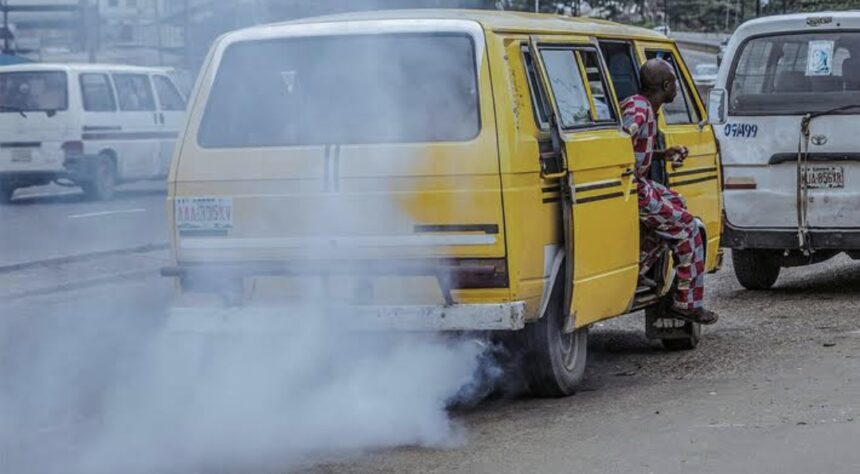As Nigeria’s commercial capital continues its relentless growth, residents say the price of development is becoming unbearable — literally. From the mainland to the island, a thick blend of smoke, exhaust and foul odours has increasingly filled the air, sparking fears of a mounting public health crisis.
In interviews across various communities, residents told the News Agency of Nigeria (NAN) that indiscriminate burning of refuse, emissions from aging vehicles and poor waste management are turning daily life into a hazardous experience.
Across Ikorodu, Sasa, Oshodi, Alagbado and other areas, smoke from burning waste and vehicle exhaust fumes linger like a blanket over neighbourhoods — a visible reminder of Lagos’ environmental decline.
For Mrs. Itunu Dada of Ikorodu, waste burning is the biggest culprit.
“People just prefer to set their waste on fire instead of paying the waste collectors,” she lamented.
“The smoke irritates our lungs and eyes. Markets are worse — heaps of refuse on road medians emit unbearable odours.”
She urged the government to be firm: shut down markets with terrible sanitation and speed up drainage waste evacuation.
In Sasa, Alimosho LGA, teacher Mrs. Stella Lawrence said she no longer expects clean air.
“Vehicles that are not roadworthy keep polluting the atmosphere with black fumes. Generators are everywhere because there’s no stable electricity,” she said, calling for strict emission checks and better waste removal.
Miss Chioma Ndukwe, a communications professional in Okota, described Oshodi as a pollution hotspot.
“Walking through the market, breathing becomes a struggle. Industrial fumes, waste burning and chaotic traffic make the air toxic,” she said, urging government action on sanitation and emission control.
Even in Lekki — often considered one of Lagos’ cleaner districts — the situation is deteriorating.
Businessman Mr. Bruno Ajede pointed to heavy traffic as the biggest contributor.
“Car fumes are everywhere, especially around Ajah. It’s already affecting people’s breathing,” he said.
In Alagbado, Mr. Ajibola Ajayi added that rampant use of poorly maintained commercial vehicles has worsened the situation.
Meanwhile, environmental advocates say policies are still misaligned with the climate goals Nigeria loudly champions.
Mr. Friday Oku, President of the Association of Wastepickers of Lagos, warned that the country’s reliance on fossil fuel is endangering lives.
“There is serious harm to the environment and human health. Yet policies contradict efforts to cut emissions,” he argued.
He criticised the recent ban on “cart pushers” — many of whom rely on manual labour — while allowing tricycles that emit far more pollutants.
“How do we fight emissions while encouraging even more polluting options?”
Oku urged a nationwide shift toward renewable energy and cleaner fuels like Compressed Natural Gas (CNG), alongside behavioural change among citizens.
Health experts warn that chronic exposure to polluted air can trigger asthma, lung infections, heart disease and cancer.
The Lagos State Government says it is not folding its arms. Through its Blue and Green Economy Initiative and the Air Quality Monitoring Network, the state has installed mobile sensors across key locations to track pollution and sanction defaulting industries and transport operators.
But residents argue that data alone won’t clear the air.
Until waste burning is stopped, sanitation improved and environmental laws enforced with real consequences, the dream of clean air in Lagos — Africa’s largest megacity — may remain out of reach.

